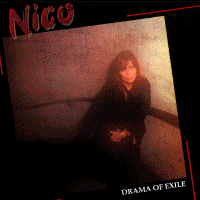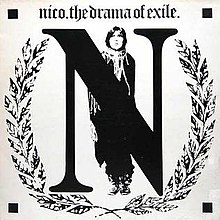Drama of Exile
| Drama of Exile | ||||||||||
|---|---|---|---|---|---|---|---|---|---|---|

Cover as it was used by Aura for their 1981 LP release, the album's first. Also used for subsequent CD releases by other labels, except the one from Cleopatra Records (see below).
|
||||||||||
| Studio album by Nico | ||||||||||
| Released | 1981 | |||||||||
| Recorded | April–May 1981 | |||||||||
| Studio | Music Works Studio, Watford, Hertfordshire, England | |||||||||
| Genre | ||||||||||
| Label | Aura | |||||||||
| Producer | Jean-Marc Philippe Quilichini | |||||||||
| Nico chronology | ||||||||||
|
||||||||||
| The Drama of Exile | ||||
|---|---|---|---|---|

The original cover used for the release of the re-recorded version.
|
||||
| Studio album by Nico | ||||
| Released | 1982 | |||
| Recorded | May–June 1981 | |||
| Studio | Music Works Studio, Watford, Hertfordshire, England | |||
| Genre | ||||
| Label | Invisible Records | |||
| Producer | Jean-Marc Philippe Quilichini | |||
| Nico chronology | ||||
|
||||
| Professional ratings | |
|---|---|
| Review scores | |
| Source | Rating |
| AllMusic |
|
| Rolling Stone | generally favorable |
| Trouser Press | unfavorable |
Drama of Exile is an album by German musician, Nico, which has two different versions and was initially recorded in 1981. The album has a complicated release history: the first release, Drama of Exile, was originally recorded in April and May 1981, whilst the second release, The Drama of Exile, is a re-recording of the first one done that same May. The album featured a Middle Eastern rhythm section and was produced by Corsican bassist Philippe Quilichini. This is Nico's first album to feature no input from frequent collaborator John Cale.
After the release of The End... in 1974, Nico's partnership with Island Records ended and she spent the majority of her time in New York City, without a record deal, appearing in a series of Philippe Garrel films.
She did, however, continue to write new songs and perform intermittently. "Purple Lips" featured in her solo sets as early as March 1975, and was also performed on French television in April 1975. Its lyrics were recited by Nico in the Philippe Garrel film Le Berceau de Cristal (1976). The earliest recorded performance of "Genghis Khan" dates to August 6, 1975, with non-LP "Procession" and "Henry Hudson" featuring in set lists from February 1977.
By March 1978, with "The Sphinx" also introduced into her set, Nico had settled on the title Drama of Exile and resolved to try a new style at odds with her previous harmonium-based sound. Nico continued to write and by early 1981 had enough songs ready to record a new album.
In 1981 executive producer Nadette Duget, who was Philippe Quilichini's girlfriend, both Corsicans, lived together with Nico at 97C Clarendon Road, (off the Holland Park Road) in London W11. Duget also had heroin connections ; She supported her own mild drug consumption, as well as her partner Quilichini's and Nico's more serious addictions.
Corsican photographer Antoine Giacomoni, who described Quilichini as "his brother" at the time, also lived there with his girlfriend, French actress an beauty queen Agnès Berthon. Bass player Quilichini and Duget had produced an album in Jamaica in 1977 by the vocal trio The Congos, who had previously issued the classic reggae album Heart of the Congos (1977) produced by legendary reggae producer Lee "Scratch" Perry. Titled Congo, the follow-up album, which featured Quilichini on bass and Giacomoni as photographer, had been released in 1979 on the CBS France label following a record deal obtained by Duget. They headed to London to produce another record, which this time would turn out to be arguably Nico's finest, most mainstream album considering the contents of her previous, more hard core albums.
...
Wikipedia

